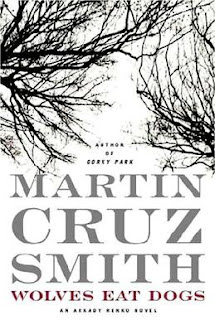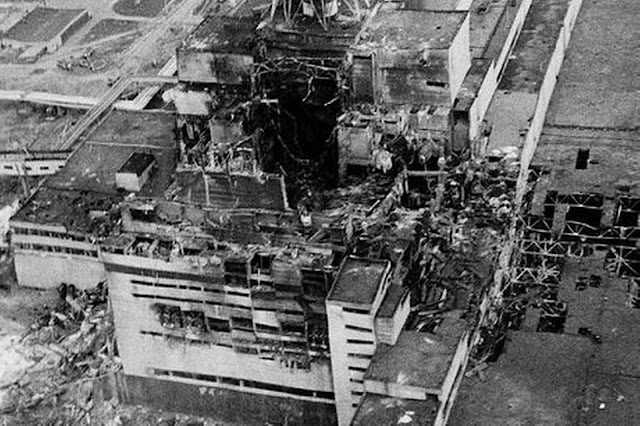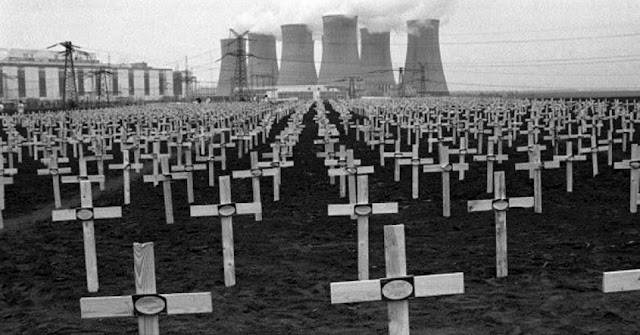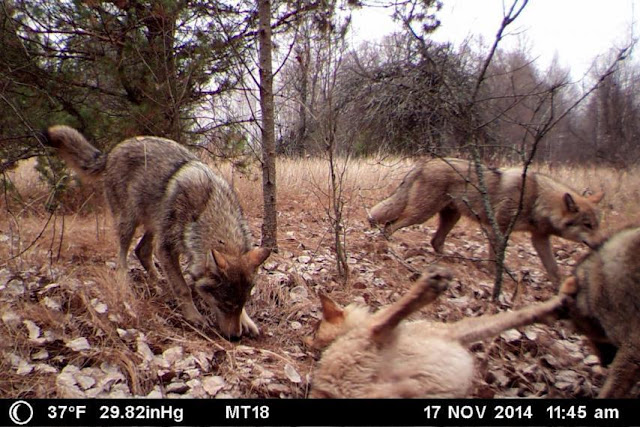Wolves Eat Dogs
starts out normally enough for Arkady Renko, Moscow's ace homicide
investigator. Assigned by Zurin, the sleazy local prosecutor, to
rubber-stamp as suicide the dramatic death of a powerful businessman,
our indefatigably skeptical Renko refuses to sign off until he is
satisfied whatever evidence he might find corroborates Zurin’s
foregone conclusion. Oddly, in a departure from Renko’s usual
dogged persistence proving the official opposition wrong, this time
(after some dogged investigation, of course) he concurs with his
boss’s presumption, agreeing that Pasha Ivanov deliberately plunged
to his death from his high-rise apartment ten floors to the street
below.
But Renko does not disappoint
us with his verdict. He has stumbled onto a new mystery as he probes
Ivanov’s death, one that not only seriously thickens the plot but
turns it quite literally radioactive. Discovering a dosimeter wrapped
in a bloody handkerchief in Ivanov’s apartment, he determines the
apartment is heavily contaminated. A HazMat team finds Ivanov’s
body is virtually glowing with radiation. It’s clear the tycoon
knew he’d been poisoned, would suffer a slow, agonizing death, and
chose suicide instead. Renko’s attention then shifts to how and why
the radioactive substance was brought into the apartment. His
inquiries focus on Ivanov’s business associates, who lean on Zurin
to call him off until Ivanov’s partner and successor to head the
business empire is found murdered in the “dead zone” around
Chernobyl, infamous Ukrainian site of the 1986 nuclear accident that’s
blamed for millions of deaths from radiation exposure.
This presents an ideal
opportunity for Zurin to get Renko out of his hair by sending him to
“investigate” the murder. Most of the rest of Wolves Eat Dogs
takes place in this hotbed populated only by a handful of peasants
who have refused to leave and by scientists studying the disaster’s
aftermath. Here, as usual, Renko runs into as much resistance as he did in
Moscow. Despite having a Ukrainian name and being the son of a famous
Red Army general, he’s seen as an outsider, i.e. a Russian, come to
make trouble. No one knew the victim, either, another Moscow big shot
whose death meant nothing to the locals. So little did they care when
a villager found the body at a cemetery, assuming death had been
natural, they stuffed it in a kitchen freezer awaiting someone to
take it to back to Moscow. After several weeks the research
community’s physician took a second look at the corpse and noticed
its throat had been cut.
The physician, Eva Kazka, is
an attractive but prickly sort, the kind of woman in every episode
who ends up coupling with Renko after considerable hissing, sparring,
and plausible indifference. In Wolves Eat Dogs, this foreplay
includes a couple of high-speed chases through heavily wooded
countryside on motorcycles.
“Kazka
looked like she would bite the head off anyone who flattered her,”
Renko ruminates as they size each other up. “She was too pale, too
dark, too sharp. The way she and Alex moved suggested a past
involvement, a momentary truce in a war.” We learn Eva and Alex,
one of the scientists,
had been married, and that their current
status is unclear.
After
some sparring in the presence of locals, Renko feels “she had
played him like a thief before a jury in front of the old women. Eva
had that knack of making a person draw too little air or speak too
loud. In front of such an individual, a man could become so aware his
weight was on his left foot that he might fall over on his right, and
the village women had practically cackled while watching the show.
She had called them survivors.”
But he
can’t seem to get her out of his mind. Here he decides she isn’t
pretty “in an orthodox way; the contrast of such white skin and
black hair...too exotic and her eyes...an unforgiving gaze. And
later, “Was he in a staring contest with her? This had to be like a
falconer’s dilemma, holding a not completely trained bird of prey
on the wrist.”
And
this (he’s warming up to her, calls her by her first name now):
“Eva was not soft.
Her pale skin and black hair—black as a cormorant’s, liquid to
the hand—set a theme of contradiction. Her eyes were dark mirrors.
Her body looked slight but was strong as a bow, and...she would have
made an excellent imp in hell, goading slow and doughy sinners with a
pitchfork. She should have come from a landscape of flames and
spewing lava.”
Will
he ever learn? Do we want him to? Does he solve the poisoning and the
murder? For us, yes. For Zurin? To hell with Zurin--doesn’t
care anyway. Does he get the crap kicked out of him, as usual? Of
course. Comes within a split second of being shot to death,
to boot. Does he get in a few good licks of his own? You know it, and
you know he gets the girl, unforgiving eyes and all.
So
what’s this about the wolves and the dogs? It’s a sub-theme
that snarls its way through the narrative in dribs and drabs,
overarching perhaps as a metaphor for big, powerful business
interests that gobble up all the little bunnies that get in their
way. The first reference to a real wolf is Renko’s mention
of a famous Russian painting, “The
Sleigh Ride, of a
troika driver throwing a horrified girl to a pursuing wolf pack.
Zurin was like that driver. He compiled files on his own
investigators, and whenever the press got close to him, he tossed
them a victim.”
On
a tour with Alex of the radiation zone around the Chernobyl power
station, he sees wolves in a stand of birch trees, “eyes shining
like pans of gold, weighing the deer, he and Alex and the deer much
the same. He remembered how the hairs had stiffened down the back of
his neck. The word ‘predator’ meant more when you were potential
prey. He laughed at himself, imagining that he was on his motorcycle
being chased by wolves.”
Later,
he reflects on a conversation he had with Roman, one of the peasants
who, with his wife, refused to leave home when Moscow ordered
evacuation of the contaminated area: “‘Wolves
eat dogs.’ That did seem to be the consensus of the village...Roman
shook his head as if he’d given the matter a lot of consideration.
‘Wolves hate dogs. Wolves hunt down dogs because they regard them
as traitors. If you
think about it, dogs are dogs only because of humans; otherwise
they’d all be wolves, right? And where will we be when all the dogs
are gone? It will be the end of civilization.’”




Is Todd collecting links this week? Barry has a new review and I have it set up to rotate over the Patti the Great.
ReplyDeleteYup. Patti's taking some time off.
ReplyDeleteI went and looked after I posted the question here and I don't think this was planned or anything happy. I hope I am wrong.
ReplyDeleteThey're having a rough patch of luck right now, Kevin. I believe Phil's scheduled for another surgery soon. I'm praying it goes well.
DeleteSaw that news there this morning. Sigh.
DeleteI remember this one and I remember it as depressing. But still a good read.
ReplyDeleteDoing Stalin's Ghost and Three Stations for next Friday (a twofer), then one more to go--Tatiana!
DeleteHaven't read any more Martin Cruz Smith primarily because I got tired of the grimness of it all. A little Renko goes a long way. But I did read one standalone by Smith, DECEMBER 6 which was pretty good too.
ReplyDeleteHaven't read Dec. 6, Yvette, but I reread Stallion Gate which kicked off this Renko marathon. I should read Dec. 6 if only because it takes place one day after I was born. One positive note about Russia's grimness for me is that it makes our troubles seem so bright by comparison.
Delete